The Mike Toole Show
Hollywood Blues
by Mike Toole,
This year's convention season is rockin' and rollin'. This week, I'm on show number three of 2017, enjoying the sights and sounds of Anime North up in Toronto. I come up to Canada for this show, and it's always an interesting time. I admire Canadian fans - it's tougher to find and buy anime on home video here, most stuff is incrementally more expensive, and they don't get the same shows on TV that we do in the States. Still, while the overall population is smaller, on a demographic, per-capita level, I've long heard that anime's more popular in the ol' True North. Looking at Anime North, it's easy to believe this; AN is a show that's every bit as big and exciting as the cons south of the border.
At every convention so far in 2017, I've ended up talking with pals and attendees about the same thing, and that thing is Ghost in the Shell. Everyone wants to talk about what we hated about the adaptation (lots of stuff), what actually worked, and what the movie's middling box office performance means for the medium of anime. I have to admit, I'm bummed that the movie didn't do better. I've got friends at Production I.G. on both sides of the Pacific, and I was really hoping that the film would turn out well and be popular, for their sakes. The success of Ghost in the Shell would've translated directly to more money, resources, and opportunities for the gang at I.G., plus a boomlet of similar adaptations for TV and film, which would've meant more rewards for the anime business on the whole. Unfortunately, what needed to happen, before anything else, was for the movie to be good. Ghost in the Shell was a number of things, but “good” wasn't one of them.
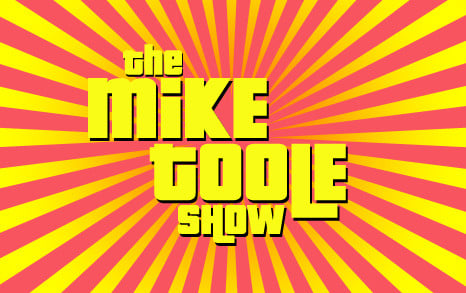
Director Rupert Sanders' take on Mamoru Oshii's adaptation of Masamune Shirow's manga is a technically proficient but weirdly uninvolving movie. As the story's central character, the Major (I hate how they clumsily dance around her background by using her squad title like it's her name) Scarlett Johansson is generally fine trying her best to anchor a weak script and work around a director who wastes way too much time attempting to ape the 1995 animated movie's best scenes instead of building something fresh that simply hearkens back to the original. This is not an exaggeration, the dude goes for a whole bunch of these peculiar shot-for-shot recreations, which are impressive but don't really go with the rest of the film. For me, the movie's sole revelation is Pilou Asbaek, who gives us a likeably gruff, canny Batou. If this Ghost in the Shell gets one thing right, it's the Kusanagi-Batou relationship.

There's been a lot of talk about this movie's casting, about how using Johansson to play what had previously been a definitively Asian character was just more lame-ass Hollywood whitewashing. I think there's truth to that and it's unfortunate, but it isn't surprising, and I don't think it made a big difference at the box office. What I do think is that Ghost in the Shell could've used was a whole lot more Section 9 – Oshii's movies may be solo character studies, but this movie does make a few swipes from Kenji Kamiyama's Stand-Alone Complex, which is way more willing to treat Section 9 like an ensemble rather than a commanding officer and a bunch of scrubs. Ultimately, I think the problem with this movie lies with the script, which is astoundingly bad. Even understanding that most big-budget movies involve an army of creatives and executives duking it out behind the scenes, I just can't figure out how something this bad makes it all the way through the creative process, to the point that the actors repeat this terrible, awkward dialogue, and then both the director and the producers are like, “Yes, this is good, actually,” and a year or so later we have a mediocre movie.
After all of that the controversy and a weak performance in US theatres, Ghost in the Shell's pulled in $170 million in worldwide takings. That's not nothing. Still, what remains in its wake is this lingering sense that there's a lot riding on every goddamn one of these anime movies, that so much depends on just one of these big-deal adaptations finally being successful, dammit! But there's no way to force the issue, and besides, let's think about this for a few minutes. How many live-action anime movies have been not just kinda OK, not just pretty alright, but actually excellent? I can't even come up with ten! What I can do is talk about the few that I think worked, and why.
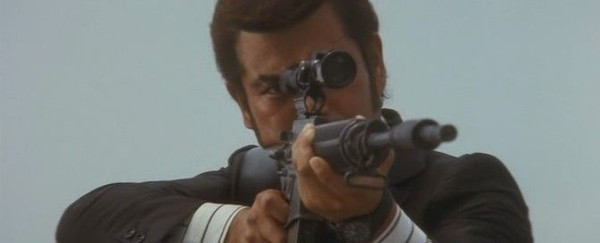
Golgo 13: Assignment Kowloon is old enough to predate the anime version of Takao Saito's manga, but I'll overlook that. Saito's original comics live and die on the appeal of the title character, a dour assassin who's more of a force of nature than a nuanced character. Therefore, the key to making a successful Golgo 13 movie is gonna hinge on getting the right actor to play Duke Togo, and then handing him a customized M-16. Here, they got Sonny Chiba, and the movie easily gets by on his raw, smokin' intensity. An exotic locale, some exciting action scenes, and good handheld camera help dish up a better than average Golgo 13 movie.
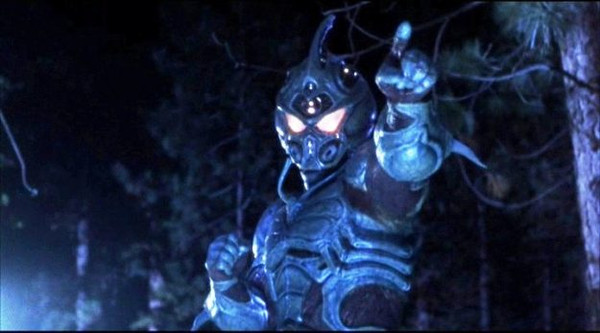
If you mention Guyver II: Dark Hero to the right kind of film nerds, they'll start rhapsodizing, not about future screenwriter and Solid Snake voice David Hayter's corny performance as the lead, but about the eye-popping special effects work of Steve Wang, which elevate this movie well beyond its low-budget genre trappings. The SFX alone aren't enough to make this movie enjoyable, but fortunately, it also dishes up some genuinely compelling psychodrama, as Hayter's character Sean Barker (“Sean Barker” is also his non-union anime voice alias!) struggles to contain the titular alien weapon's power and psychosis, even as he must use it to defeat a pack of monsters. I like this movie—it's got a weird, straight-faced sincerity that somehow just works. Maybe I'm not the most reliable source, because I also enjoyed the first (largely unrelated) Guyver film, which featured wacky rubber-suited villains and both Mark Hamill and Jimmie Walker having a great time in throw-away roles.
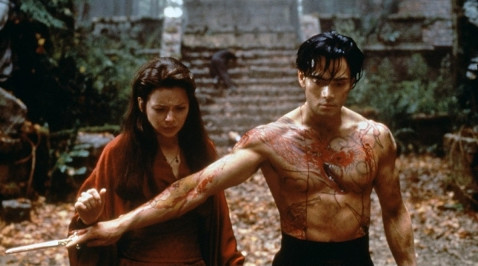
When it came out in 1995, Crying Freeman didn't have a prayer of breaking out or making waves anywhere—it had a few known character actors, but no big stars, and it was made well outside of the Hollywood system. This is a shame, because this movie really gets it right! As the title character, Mark Dacascos is superb – it helps that he's an accomplished martial artist and stuntman, along with being suitably pretty enough to play Kazuo Koike and Ryuichi Ikegami's famed weeping assassin. As an adaptation of Koike's manga, this seriously comes pretty close to the excellence of the Lone Wolf & Cub films. It's also a good companion to director Christophe Gans's follow-up and breakout hit, Brotherhood of the Wolf, which briefly put both him and Dacascos on the map.

There was a time when Cromartie High School was one of the most popular manga going. There was an anime version, and there was this film. When director Yudai Yamaguchi approached manga artist Eiji Nonaka for advice on recreating his work for the big screen, he received a response typical of the laconic artist. “I don't care,” said Nonaka. “Do whatever you want.” The director took the mangaka's advice, and in this way, Cromartie approximates the gleefully chaotic tone of the manga and anime by simply making shit up as it goes along. It does open with a number of recreations of the manga's funny opening chapters, concerning a good boy accidentally going to a very bad school full of tough guys, including a gorilla and a muscular Freddie Mercury lookalike. The film is held up by solid, stoic performances from the boys of the school, and climaxes with a nutty finale involving a big fight with none other than Space Ape Dr. Gori from Spectreman. If you're stuck with a microscopic budget and middling acting talent, this is the way to get a good movie out of it.
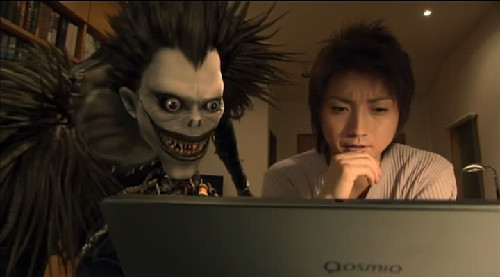
I wasn't too impressed with the first Death Note film. I felt like the movie's lead, Tatsuya Fujiwara, wasn't able to give the character of Light Yagami, a high school sociopath who gains the power to anonymously kill people using the titular Death Note, any real menace. That aspect of the movie, paired with a relatively weak CG depiction of Light's otherworldly grim-reaper buddy, Ryuk, made me lukewarm on the picture, despite a good performance by Kenichi Matsuyama as Light's adversary, the detective L. But balance was restored by the generally excellent second film, which sees Fujiwara grow into his role, and really amps up the suspense of the story. Don't let anyone tell you about the third film, a prequel about L. It never happened, alright?! There's no such movie!

Speed Racer was destined to fail. It was always a little too weird, not quite popular enough (the cartoon is widely-known, sure, but it's always been a cult hit at best), and cost way too much money to make. I'm still really happy it got made, though, because it rules! The film's directors, the Wachowskis, have an affection for the source material that is so palpable it radiates off the screen like stink lines, but as with most of their movies, they're also pretty intent on creating something new that exceeds and transcends the original. Almost a decade later, seeing Speed Racer up close in high definition is kinda weird – the movie's use of pan focus (the Wachowskis developed a new lens for this, one that's both super wide-angle and that keeps everything on focus) is eye-popping, and the Mach V, a mostly CG creation, looks absolutely bananas in smooth 1080p, like a car from another planet. I won't say that Speed Racer doesn't have problems- the B-plot involving Taejo is completely forgettable – but this is still a marvelous toy of a movie, one that I'm always happy to watch again.

The first time I heard mutterings about the live-action Space Battleship Yamato, I wrote it off. Producer Yoshinobu Nishizaki hadn't gotten anything done in years. But then his animated Yamato Resurrection dropped to generally good notices, and paired with it was a trailer for the live-action film that actually looked kinda good. The movie that we ultimately got is interesting, an adaptation of Yamato that owes a lot to Battlestar Galactica in both aesthetics and narrative. It does an excellent job stealing that TV show's visual tricks and using them well. As the heroic Susumu Kodai, Takuya Kimura lacks the proper gravitas, and the movie's version of the story's adversarial Gamilas empire is similarly underwhelming, but this is still a sturdy picture that will scratch your space battleship itch. Of all of the live-action Hollywood anime projects that they've periodically threatened us with, but have never actually gotten anywhere near principal photography (e.g. Robotech, Voltron, Akira) I think a live-action Star Blazers has the most potential. Just don't change the Yamato to the USS Arizona, for heaven's sake.

Pretty much everyone who saw the Rurouni Kenshin films told me that they were generally excellent, enjoyable adaptations. They were correct. These movies look great, with beautiful sets and costumes that recreate the story's Meiji-era setting, and have solid performances. Takeru Satoh's a revelation as Kenshin; the former Kamen Rider actor carries the character's humor and angst exceptionally well. The movie also approximates the anime and manga's fight scenes nicely, using a mix of wire-fu and CG. This is movie trilogy, and like most trilogies, it starts running low on gas at the end—they try to kinda mush a lot of character and story stuff together down the stretch, but these three Kenshin movies still hold together brilliantly, and should probably be the standard by which other new adaptations are judged.
So, how many movies is that? Eight. Eight adaptations of well-known anime that are at the very least better than average, and maybe bordering on excellent. That small group sticks out of an expansive swamp of cheap, weird, dumb movie versions of anime, stuff like Fist of the North Star and 8 Man and Tiger Mask and Tomorrow's Joe and Gatchaman and that 2014 Lupin the 3rd movie and Wild 7 and Terra Formars and that terrible, awful Casshern movie. You remember the one, right? It had that one incredible fight scene, but that was the only thing going for it. Way to get our hopes up and then crap all over us, Kazuaki Kiriya! There have also been adaptations that aren't bad, but aren't that great—stuff like Gantz and Yatterman and Paradise Kiss and those two Attack on Titan movies, which had a couple of really good parts but were otherwise forgettable. It's kinda troubling that there are so many of these adaptations, but so few of them really rise above.
All that's left to do is look ahead. On the Japanese side, we're in the middle of a bubble of adaptations, with recent openings of Blade of the Immortal and Hurricane Polymar, plus premieres of Gintama, Tokyo Ghoul, Jojo's Bizarre Adventure, and Fullmetal Alchemist happening later this year. In Hollywood, we've got Battle Angel to look forward to. Now, I like Robert Rodriguez more than most of my film snob pals, but that guy's gone kind of a long time without a really good movie that didn't have Machete in the title. But he's got a pretty great cast, and principal photography is over. That movie is happening, and happening soon. My one question is this: why are they still calling the heroine Alita, and not Gally?
Just think, in a couple of more months, Ghost in the Shell will land on VOD and home video, so we'll have the chance to dissect it all over again. For a time, some of us thought that this was gonna be the movie, the one that would really put anime on the map as a storytelling force to be reckoned with. Well, we're gonna have to keep waiting for that moment. What do you think needs to happen for one of these adaptations to be a global hit? Me, I think the movie itself needs to be good. Start there, and the rest should be easy, assuming your movie isn't Speed Racer.
discuss this in the forum (64 posts) |